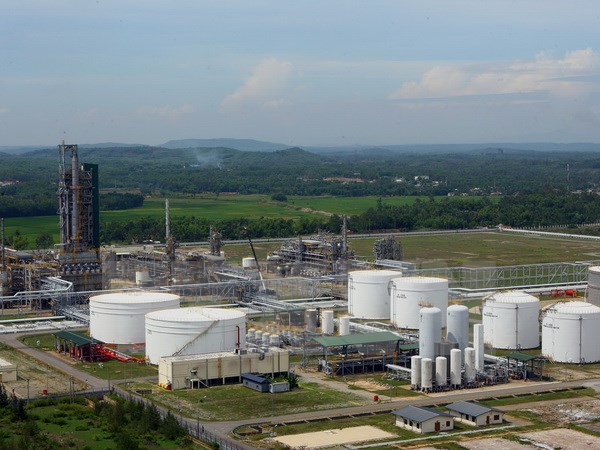Binh Son Refining and Petrochemical reports positive business results ahead of IPO
 |
| Dung Quat Oil Refinery |
Positive business results
According to the released financial statement, in the first six months of 2017, BSR generated nearly VND38.7 trillion ($1.5 billion) of net revenue and more than VND3.8 trillion ($152 million) of after-tax profit, up 15 and 266 per cent, respectively, compared to the same period last year.
At the end of the second quarter of 2017, BSR’s cash and cash equivalents were more than VND15 trillion ($600 million), which accounted for 28 per cent of its total assets. The huge amount of cash and operating cash flows help BSR pay off matured debts and ensure its ability to pay off debts, as well as support its plan on investment and business expansion.
Regarding financial structure, BSR’s liabilities declined due to the gradual reduction of the principal portions of long-term borrowings. At the end of the second quarter of 2017, liabilities decreased to over VND13.5 trillion ($540 million) from more than VND41 trillion ($1.6 billion) in 2010.
Besides, the reduction of principal portions leads to a decrease in interest expenses. In particular, in 2016, BSR’s total interest expenses were VND605 billion ($24.2 million), a reduction of 63 per cent in comparison with 2011. In the first half of 2017, BSR’s interest expenses decreased by 18 per cent compared to 2016.
BSR’s financial statements revealed that in recent years, BSR’s current ratio, the ratio measuring a company's ability to pay short-term and long-term obligations, has been bigger than 1, and after 2015, this ratio has been bigger than 2.
In addition, also in this period, its quick ratio, an indicator of a company's short-term liquidity, has been bigger than 0.5 and after 2014, this figure has been bigger than 1.
These ratios show that BSR has the ability to pay off its debts. Besides, these ratios are likely to increase throughout the years, demonstrating that BSR’s ability to pay off debts on time is getting better.
Talking about the thriving business results in the first half of 2017, BSR’s leaders said that thanks to the adjustments of Decision No.952/QD-TTg, BSR now can decide on its product selling price instead of following the regulated formula.
Thus, now BSR’s products have a more flexible and competitive price, which promises to accelerate its business development in 2017.
IPO plan
When asked about BSR’s preparations for its IPO, a representative said that everything is on track and the IPO is expected to take place at the end of 2017. At present, BSR’s value has not been officially released, so it is difficult to say an exact number. However, with the $3-billion Dung Quat Oil Refinery, it is forecasted that BSR’s value will not be small.
According to Tran Ngoc Nguyen, general director of BSR, the company’s stock offering will be divided into two steps. In particular, at the end of 2017, BSR will sell its stocks to staff and conduct its first IPO. Next, BSR will sell stakes to strategic shareholders within 12 months of its IPO.
“As BSR is a big enterprise, in 2017, we plan to sell 5-6 per cent of the state-owned stake,” Nguyen said and added that the stake offered to BSR’s staff is smaller than 1 per cent.
Seeking appropriate strategic shareholders with strong financial ability and experience in the petrochemical sector is considered an important mission to BSR, especially as it is implementing the project on Dung Quat’s upgrade and expansion. It is expected that Dung Quat’s annual refining capacity will rise from six million to 8.5 million tonnes of crude oil.
Currently, BSR has spread its offerings to 15 foreign investment funds which are said to hold great potential to become BSR’s strategic shareholders. Besides, there are many petrochemical enterprises from South Korea, Venezuela, and Russia that has expressed interest in BSR’s offerings. However, up till now, BSR has not picked strategic shareholders yet.
A representative of a foreign oil and gas enterprise operating on the Vietnamese market said that BSR’s requirements for strategic shareholders, including buying more than 36 per cent of BSR’s chartered capital and at the same time supporting its expansion plan on Dung Quat Oil Refinery, will only be met after BSR clearly shows investors their potential benefits.
With the estimated investment sum of nearly $2 billion, the project on expanding Dung Quat Oil Refinery will borrow 70 per cent of the needed capital. Nguyen said that BSR is dealing with domestic and international credit institutions to borrow nearly $1.3 billion.
Of the total borrowings, 50 per cent will be sourced from export credit agencies (ECA) and the other half will be borrowed from domestic commercial banks.
“If this project is guaranteed by the government, we can borrow at preferential interest rates, instead of normal commercial loan interest rates,” Nguyen said.
What the stars mean:
★ Poor ★ ★ Promising ★★★ Good ★★★★ Very good ★★★★★ Exceptional
Latest News
More News
- Vietnam’s industrial output hits seven-year high in 2025 (January 06, 2026 | 17:47)
- From easy money to selective bets: investment prospects for Vietnam in 2026 (January 06, 2026 | 16:51)
- Finance sector lays firm groundwork for 2026 after major reform (January 06, 2026 | 15:30)
- Stock market starts 2026 with growth and governance in focus (January 06, 2026 | 08:45)
- Ho Chi Minh City backs $2 billion AI data centre with dedicated task force (January 06, 2026 | 08:43)
- Vietnam GDP posts second-strongest growth since 2011 (January 06, 2026 | 08:35)
- Double-digit GDP growth within reach with shift to higher-value expansion (January 06, 2026 | 08:33)
- Ho Chi Minh City projects $10.5 billion remittance inflows in 2025 (December 31, 2025 | 18:58)
- Digital shift reshaping Vietnam’s real estate brokerages (December 31, 2025 | 18:54)
- New decree sharpens enforcement in securities market (December 31, 2025 | 18:53)
















 Mobile Version
Mobile Version